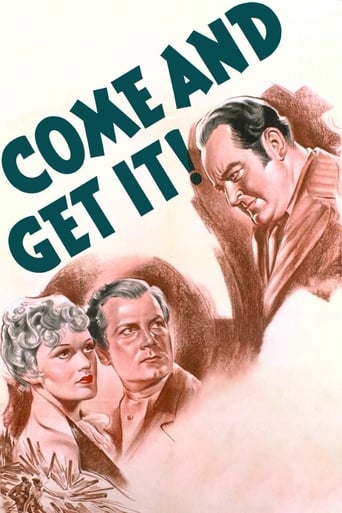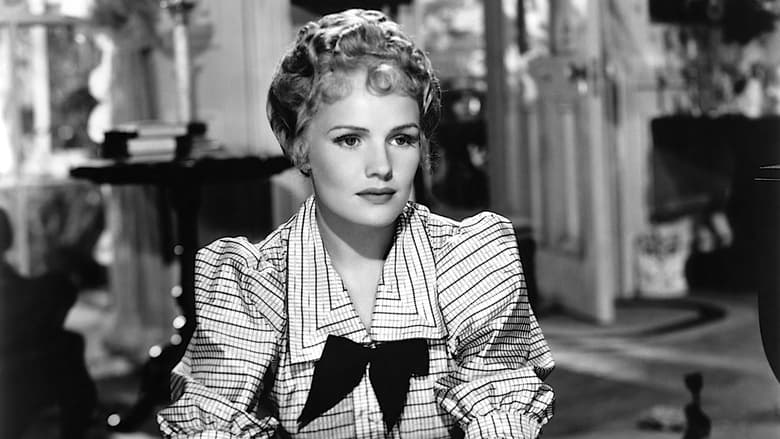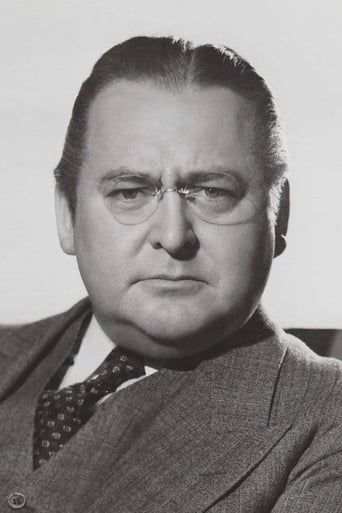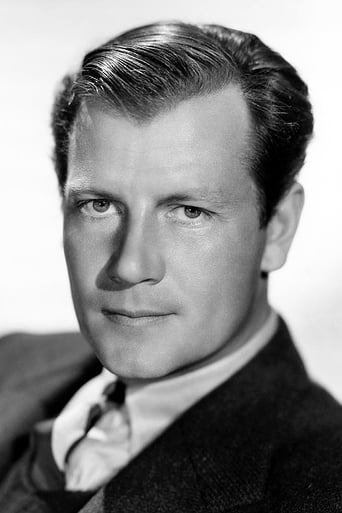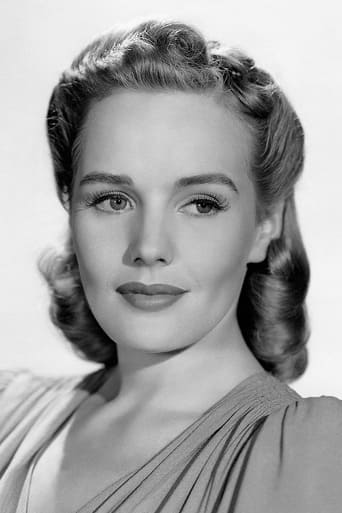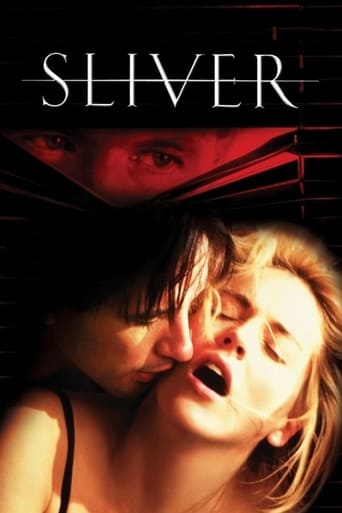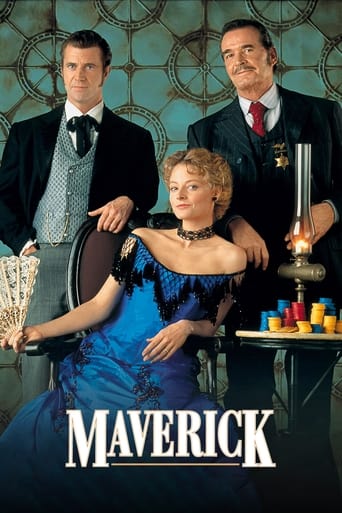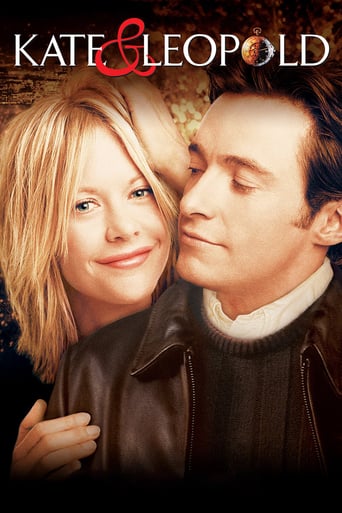Come and Get It (1936)
An ambitious lumberjack abandons his saloon girl lover so that he can marry into wealth, but years later becomes infatuated with the woman's daughter.
Watch Trailer
Cast


Similar titles
Reviews
A very wonderful film showcasing the talent of Edward Arnold. The latter was usually a supporting player but this film belonged to him all the way.He is the 1936 answer to Jean Brodie. This guy still thought 20 some years later that he was still in his prime. I can never forget the vivid scene when he finally realizes that his prime has long since passed him by when he is literally vying for the affection of his late girlfriend's daughter, who has fallen for his dashing son, played to the hilt by Joel McCrea.In the double role of the girlfriend and her daughter, Frances Farmer showed that awesome vulnerability that she had in her brief career. Too bad that her years were marked by mental anguish. She would have been a wonderful star of the screen.Walter Brennan put on an authentic Swedish accent and was rewarded for it with the Academy's first Oscar for best supporting actor. 11 years later, Loretta Young went Swedish as well, and that helped her garner a surprise best actress win for "The Farmer's Daughter."It's basically the old story of marrying into wealth rather than what would make you happy, but the film was done remarkably well.
There was co-director but this sure looks like Howard Hawks. For one thing, there's Frances Farmer, Hawks' type of woman -- young, beautiful, throaty. For another, it's almost a rough draft of "Red River". An ambitious man leaves the woman who loves him. The woman dies in his absence. Years later, he and his son meet another woman who reminds the father figure of the girl he once lost. The son falls in love with her. Conflict ensues between the two men, with the father provoking a physical fight with the younger man. The older man realizes that he's been foolish and the son winds up with the girl. (I think it was Robin Wood who first pointed out these parallels.) And that climactic scene -- with the father (Edward Arnold) slapping his son (Joel McRea) -- appears not just in "Come and Get It" and "Red River" but, in altered form, in Hawks' "Billy the Kid." Anyway, Arnold is the hearty, blustering man of business who slips sideways into a marriage de convenance, leaving Frances Farmer behind. She's good looking enough and might have been a decent actress if she hadn't been mentally ill.Good scenes of cutting timber and processing the logs into sheets of wood. Good depiction of stubborn robber baron mentality too -- Arnold bellows cheerfully, "Why by the time I'm done there won't be ten cents worth of timber left." Joel McRea is a stubborn kid who invents the paper cup and who has notions about replanting the forest, both of which Arnold believes to be nonsense. Florence Kluckhohn, the anthropologist, suggested humans have three ways of relating to nature: conquer it, live in harmony with it, or be subjugated to it. For Arnold's rabid capitalist, it's always "Vici, vici, vici." He rails against Teddy Roosevelt and his trust busters. It wasn't that way in the old days when you could shave an entire ecosystem down to stubble. Why can't they leave a man alone to do things the way they've always been done. An appealing sentiment. Well, it must be appealing because it appears so often in advertisements and commercials. "Never had it. Never will." It's kind of an interesting thread that is only brought in a few times and then discarded.What the script lacks in social comment -- something that never interested Howard Hawks anyway -- it makes up for in its examination of the psychodynamics of Edward Arnold. He begins as a greedy devil-may-care hard working poor guy. His fling with Frances Farmer is nothing more than that to him. But after he leaves and she dies, he finds himself in a companionate marriage that doesn't satisfy him. His old friend (Walter Brennan) had married Farmer and they'd had a daughter. When Arnold visits his old friend again, the first time in twenty years, he is struck by Brennan's daughter who looks exactly like Frances Farmer -- and in fact IS Farmer in a dual role.Arnold is now rich and powerful but he's fifty years old, more than twice the age of Brennan's daughter. Well, as they say, there is no fool like a fool who has had twenty years to get used to having everything he's ever wanted -- and he wants Farmer. It doesn't do him any good. He showers her with gifts and finally proposes that they set up in a Chicago apartment where no one will know what's going on. She's repulsed, of course, and he comes to his senses.It's difficult for all of us to finally come to our senses, and the last shot of Edward Arnold ringing the huge triangle at his mansion, calling everyone to dinner, and braying, "Come and get it!", with his eyes filled with tears, is a tragic one. He's one of those people who made the wrong choice years ago, just like the rest of us.
COME AND GET IT has a very strange cast. Having the reliable and talented supporting actor, Edward Arnold, in the lead is strange--especially since this rotund and rather doughy guy is cast as, believe it or not, a lumberjack when the film begins! Seeing him supposedly fight and beat up tough guys seemed pretty funny--especially since Arnold looked as if he'd have had a hard time beating up Frances Farmer--let alone burly lumbermen!! Additionally, having him play a very flawed hero who has a penchant for a very young lady (Frances Farmer) make it an unusual film.The film begins with Arnold being made the foreman of a logging company. However, his ambition is huge and he immediately has his sights set on running the entire company. So, to do so he agrees to marry the boss' daughter even though he could care less about her. Additionally, he'd just fallen in love with a spunky saloon singer (Frances Farmer--in a dual role). Regardless, his ambition is primary and he dumps farmer on his pal, played by Walter Brennan (who received an Oscar for his performance as a nice Swedish guy).Years pass. You see that Arnold's wife is a bit of a cold fish, though they did have some kids and they now own the company. Arnold just happens to visit his old pal Brennan and finds that through the magic of Hollywood clichés, Brennan's daughter (played by Farmer again) is the spitting image of her deceased mother. Arnold is an old lecher and takes her under his wing--with the intention of recreating the relationship he'd had with her mother. When his oldest son (Joel McCrea) finds out, he goes to confront the lady but falls for her instead. Naturally, this sets the son and hard-driven father against each other.Considering that this is based on an Edna Ferber novel, it isn't surprising that the film is about a man building an empire as well as infidelity--recurring themes I've noticed in several of her other films that were filmed during the era (such as CIMARRON, GIANT, SHOWBOAT and SO BIG). As a result, the film has a big and rather sweeping quality about it but is also a study of a hard-driven man who is deeply flawed.Overall, the movie is exactly what you'd expect from such a film--good acting, big scope and a lot of romantic tension. Nothing extraordinary here, but it's enjoyable and competently made. I can't, however, understand how Brennan got an Oscar, as this was far from one of his best performances. Perhaps it was a slow year.
"Come and Get It!" (1936) Richard Glasgow is busy proving his worth in his father's lumber empire. That is proving difficult. Daddy's not interested in replanting and replenishing the land. He has a hard time accepting Richard's new ways and product inventions.On top of that, Father (Edward Arnold) and Richard (Joel McCrea) are vying for the love of the same young woman, Lotta (Frances Farmer). That is also proving difficult. Timber Baron Barney Glasgow loved her mother, Lotta, but he chose to marry the boss's daughter (who is still living). And that move brought him the timber company.Lotta married Barney's best friend Swan (Walter Brennan) and they had young Lotta. She's her mother's spitting image. Now son Richard is interested in Swan's daughter and she in him. They make a lovely couple. Needless to say Barney, doesn't like this arrangement. He's in love. Well, like they say, "There's no fool like an old fool." It's not a great movie but it and the cast is good and there are lessons to be learned. See it if you get a chance.

